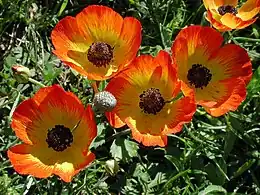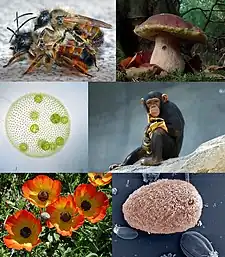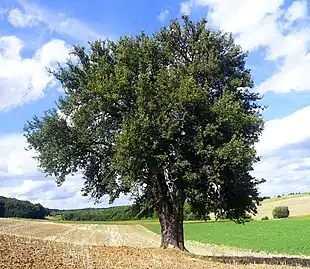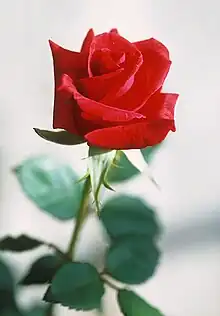augs
Latvian
| Picture dictionary | |||||
|---|---|---|---|---|---|
| |||||
|
Etymology 1
Coined in 1859 by Heinrihs Kavals, from the same stem as the verb augt, made into a masculine first-declension noun (ending -s), and later popularized by Atis Kronvalds, replacing in this sense the word stāds, now more restricted in its use. The alternative form auģis, proposed in the early 1860s by E. Dinsbergs, never became popular and was soon abandoned.[1]
Alternative forms
- (obsolete form) auģis
Pronunciation
- IPA(key): [âwks]
| (file) |
Noun
augs m (1st declension)
- plant (higher living organism capable of photosynthesis: herbs, bushes, trees, etc.)
- viengadīgs, divgadīgs, daudzgadīgs augs ― annual, biennial, perennial plant
- savvaļas augi ― wild plants
- istabas augs ― indoor plants
- dekoratīvie augi ― decorative plants
- ēnas augi ― shady plants
- ūdens augi ― water plants
- audzēt lopbarības augus ― to grow fodder (lit. cattle) plants
- augu sugas ― plant species
- augu valsts ― the vegetable (lit. plant) realm
- augu tējas ― herbal (lit. plant) tea
- augu eļļas ― vegetable (lit. plant) oils
- zemākie, augstākie augi ― lower, higher plants
- auga virszemes daļas ― above-ground plant parts
- augu slimības ― plant diseases
- augu fizioloģija ― plant physiology
- dzirdot vārdu “augi”, vispirms iedomājamies dārzu, druvu, pļavu vai mežu, bet augi sastopami arī ūdenī ― hearing the word “plant,” we first think of gardens, fields, meadows or forests, but there are plants also in water
Usage notes
Augs is the basic term for "plants." Stāds usually refers to plants that were actually planted (e.g., in a garden) by someone, not to wild plants.
Declension
Synonyms
- dēsts
- stāds
Etymology 2
from the same stem as the verb augt, made into an adjective (augs, auga), originally meaning “growing, increasing,” from which “that which continues all the time” and now “all, (the) whole,” used with nouns denoting time. In current standard Latvian, it is found mostly in the instrumental case.[2]
Pronunciation
- IPA(key): [âwks]
| (file) |
Adjective
augs (no definite forms; irreg. adv. (none))
- (in time expressions, usually instrumental) all, whole (the entire time period)
- strādāt augu dienu ― to work all day long, the whole day
- raudāt augām naktīm ― to cry whole nights
- augām dienām sēdēt pie grāmatām ― to sit in front of books for whole days
- sen manā sirdī ilgas sēd, / uz āru laužas ar varu; / tās augu mūžu sirdi ēd, / pret sienām sitas ar sparu ― there have long been desires in my heart, / they break out with force; / (my) whole life they eat (my) heart, / beating against the walls (of my body) with vigor
Declension
| masculine (vīriešu dzimte) | feminine (sieviešu dzimte) | ||||||||
|---|---|---|---|---|---|---|---|---|---|
| singular (vienskaitlis) |
plural (daudzskaitlis) |
singular (vienskaitlis) |
plural (daudzskaitlis) | ||||||
| nominative (nominatīvs) | augs | augi | auga | augas | |||||
| accusative (akuzatīvs) | augu | augus | augu | augas | |||||
| genitive (ģenitīvs) | auga | augu | augas | augu | |||||
| dative (datīvs) | augam | augiem | augai | augām | |||||
| instrumental (instrumentālis) | augu | augiem | augu | augām | |||||
| locative (lokatīvs) | augā | augos | augā | augās | |||||
| vocative (vokatīvs) | — | — | — | — | |||||
Synonyms
Etymology 3
See augt.
References
- Karulis, Konstantīns (1992) “augs”, in Latviešu Etimoloģijas Vārdnīca (in Latvian), Rīga: AVOTS, →ISBN
- Karulis, Konstantīns (1992) “augt”, in Latviešu Etimoloģijas Vārdnīca (in Latvian), Rīga: AVOTS, →ISBN




